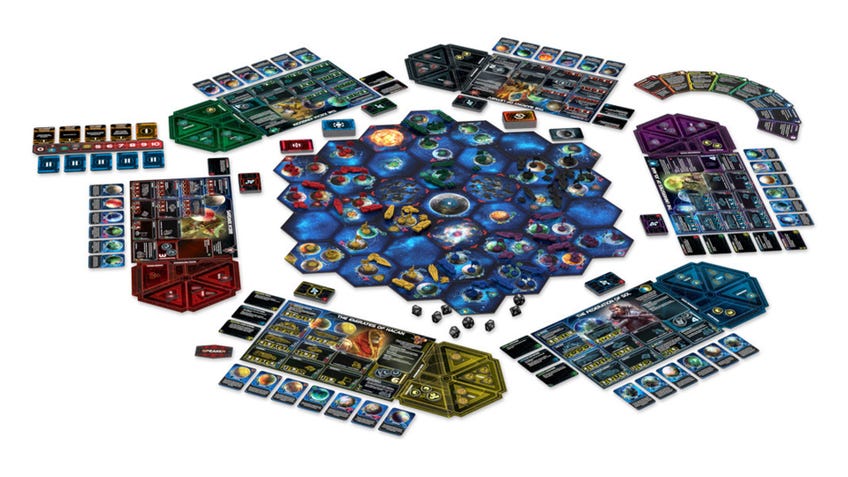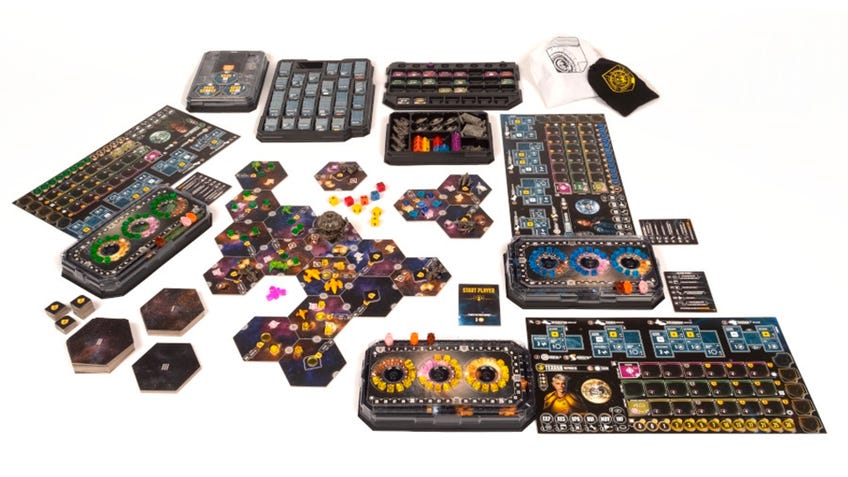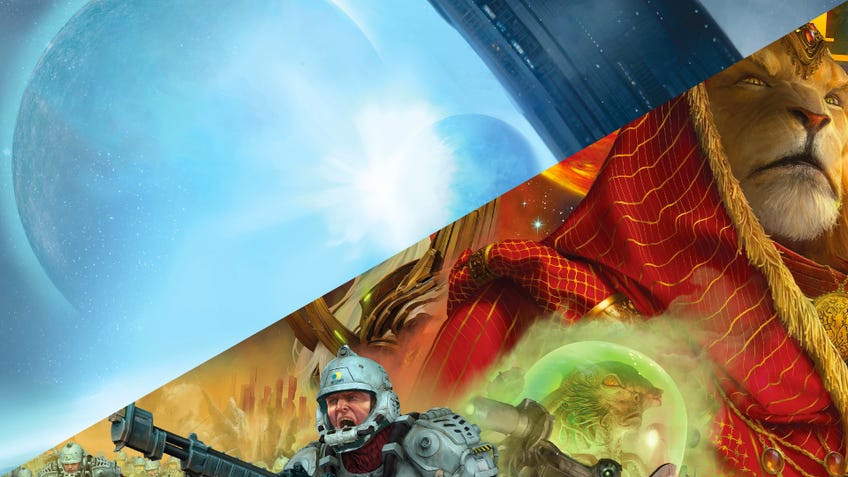A battle of galactic proportions: Eclipse: Second Dawn of the Galaxy vs Twilight Imperium 4E
Two sci-fi heavyweights enter, two are consumed by the endless void of miniature ships.
The hobbyist board game scene is an all-encompassing one, with interests ranging from obsessions with train yards and stocks to the fictional giant scorpions of ancient Egypt. However, one idea stands above the rest: plastic in space. Two competitors enter today: the continually retooled Twilight Imperium (now in its fourth edition), and the relatively new cool cat Eclipse (in a modest cosmetic second edition). Only one will win the coveted title of the big-box starry empire that's right for you.
At first glance both behemoths in their cardboard coffins look pretty similar. They share a smorgasbord of differently-sized plastic ships, hexagonal tiles and control tokens - I wouldn’t blame anyone for asking if they were just slight variations on a theme. But there is one rather notable difference on each game's box: playtime. Eclipse promises a playtime still rather intensive for most casual gamers: between one to three hours. That’s a drop in the bucket compared to Twilight Imperium and its printed box time of between four to eight hours. Even that time is historically misleading if any first time players are in the midst, though, upping the playtime to anywhere from six to 12 hours. Both boxes are proverbial board game rock stars, but Twilight Imperium basks in its own grandeur. This is all the pre-show, though - what happens when you try to get these puppies up and running?
There’s been plenty of poetic waxing about setup and teardown in the hobby. It’s clearly a topic on the minds of players, with companies such as Folded Space and LaserOx providing consumers with a rich swathe of custom storage that promises easier playability. That matters for these epic sprawling experiences because being able to play the game is the first battle.
Twilight Imperium wants you to be champing at the bit to play, which is very distinct from Eclipse’s approach.
Twilight Imperium has a working but inelegant storage solution, a vast improvement over the options given by other Fantasy Flight titles like Arkham Horror. Even so, setup will still take you at least 45 minutes to an hour, as you pull out the customised cardboard chits for each of the base game's 17 factions and either set up the galaxy yourself or add another stage to the game - building the galaxy in a delightful cut-throat minigame, one that sets up the galaxy as a boon for you or a bane for your friends. Twilight Imperium wants you to be champing at the bit to play, which is very distinct from Eclipse’s approach.

Where Twilight Imperium’s setup is arduous, Eclipse’s is easy. GameTrayz pre-sorting components and a near-identical set of components for each player make setting up much quicker, allowing players to get their grubby little mitts on spacefaring ships that much faster. Eclipse starts off with a casual and easy setup which almost continues through the game itself.
Eclipse wants you to know the arc of the galaxy before you get in deep. Twilight Imperium takes you for a joyride.
That's the thing - in Eclipse, things get going and resolve quickly for the game’s heft. Twilight Imperium, on the other hand, is an event. Eclipse is a delightful, elegant evening of fine-tuned ship-building and exploration; the game comes with restaurant-like menus for the various upgrades to your ships and tech. Eclipse wants you to know the arc of the galaxy before you get in deep. Twilight Imperium takes you for a joyride.
These differences in approach show even more starkly in other areas of the games. The nature of Eclipse as a structured game comes from the way it resolves its rounds, especially in stark comparison to grandpappy Imperium. Eclipse is honest with you: eight rounds and no more. Over those eight rounds, you grind for tech, control territory and participate in glorious battles to win. Twilight Imperium is far more snarky. Sure, it says, you can win by winning fights and controlling territories, but the mercurial objectives revealed slowly round after round say otherwise.
Combat is another animal altogether. Eclipse is clear with its stakes. Your ships are weak and you have to improve them. How you do it is up to you, but you need superior firepower, armor, accuracy - or all three. With the dice generally being more receptive to generating hits (with only one of the die’s six sides guaranteeing a miss), when you initiate a fight it’s because you know what’s coming.

In Twilight Imperium you roll handfuls upon handfuls of 10-sided dice. It's pure schlock, plain and simple. You’re double-fisting plastic and popcorn in these moments of utter childish chaos. The trick is that it’s dramatic. The tension swells when the odds aren’t in your favour and you roll many hits. The game is like seeing a guitarist’s string break during a performance and watching as they just keep going. Eclipse’s combat is a chess game, Twilight Imperium is a bare-knuckle brawl.
Eclipse’s combat is a chess game, Twilight Imperium is a bare-knuckle brawl.
Not to mention the fact that negotiation is a crucial facet of the gameplay in Twilight Imperium, with last year’s Prophecy of Kings expansion filling out the game in such a way that it’s almost a must-have for those who fall in love with this space classic. The expansion includes a beefy new exploration mechanic and new factions that turn an already intense experience into a multi-day carnival of the animals
If you want a spacefaring adventure to bring into your daily rotation, Eclipse: Second Dawn for the Galaxy is a very tempting choice. The game’s consistency and ease of play means it goes over smoothly with groups from two to six. For an event though, for a truly theatrical experience, it’s hard to compete with the all-day nature of Twilight Imperium: Fourth Edition. You may only play Twilight Imperium once a year, but each game becomes part of the social consciousness of that group - the alliances and victors form a memetic tale that won’t be forgotten. At least, until the next massive, galaxy-wide game comes out.




